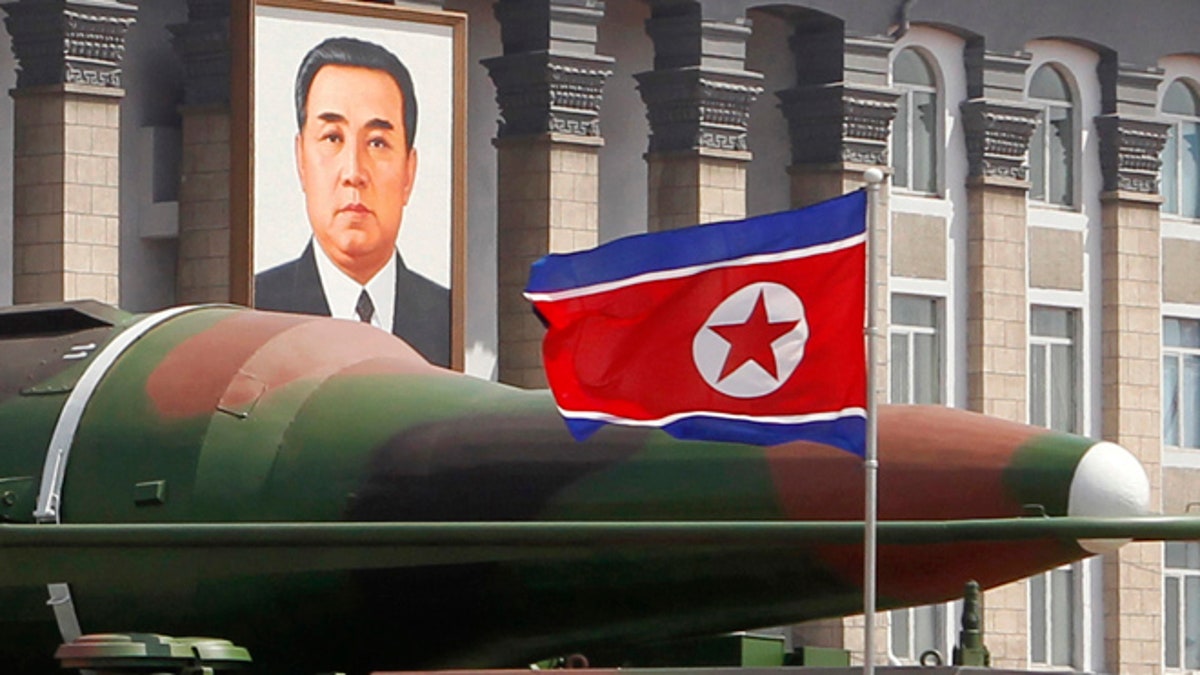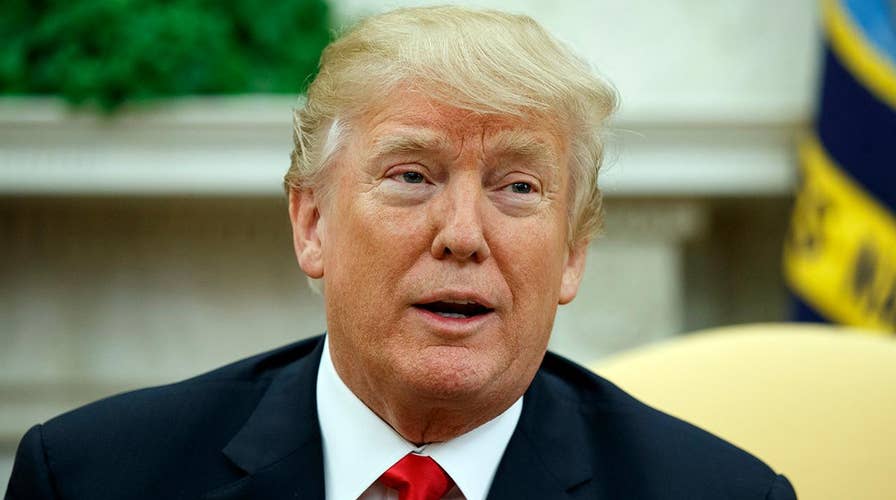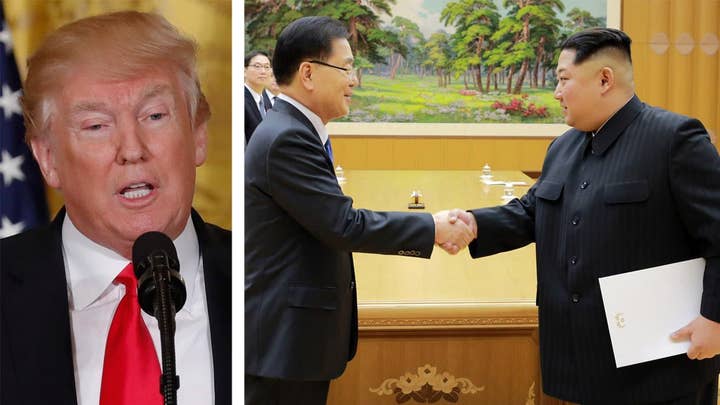Trump's tough stance brings North Korea to bargaining table?
Should President Trump's leadership style be credited for possible peace talks? Ambassador John Bolton shares his perspective on 'Fox & Friends First.'
President Trump may have just forced North Korean strongman Kim Jong Un to come the negotiating table…with maybe just a little help from Twitter.
Experts say that Trump’s strategy dealing with the rogue regime – a combination of tweeted warnings and mockery, tough sanctions and pressure on China and others to tow the line – is bearing fruit. Evidence came this week, when Kim told a delegation from South Korea his regime is willing to discuss nuclear disarmament with the United States.
“While I wouldn’t say that Trump has the Kim regime crying 'uncle,' I would say, to use a sports analogy, that North Korea is now like a running back looking for space to move in the backfield," Nicholas Eberstadt, a political economist at the American Enterprise Institute, told Fox News.
Trump has ridiculed Kim by calling him "Little Rocket Man," warned that his "nuclear button is bigger" and announced that the dictator's beliigerance "will be met with fire and fury the likes of which the world has never seen."
“Military solutions are now fully in place, locked and loaded, should North Korea act unwisely,” Trump tweeted in August. “Hopefully Kim Jong Un will find another path!”
While the inner workings of the North Korean economy are deliberately shrouded by the Kim regime, observers note that there are signs that the sanctions imposed by both the U.S. and the United Nations over the last year are having the desired effect.

A new missile is carried during a mass military parade at the Kim Il Sung Square in Pyongyang, North Korea. (AP)
During his New Year’s Address, Kim openly admitted that the country faced “the harshest-ever challenges” and “difficult living conditions caused by life-threatening sanctions and containment.” The third-generation strongman warned 2018 would also be tough and that the country would need to become more self-reliant.
Then there were the overtures made by Pyongyang before and during the Winter Olympic Games in South Korea last month, which are seen as a way for the Kim regime to ease the pressure on the country from the sanctions.
Sanctions have been imposed on North Korea for decades, but the regime has always managed to evade them thanks to illicit deals with China, Russia, Iran and others. But Trump has put new pressure on other countries to enforce ever-harsher penalties.
The U.S. last August enacted the Countering America's Adversaries Through Sanctions Act, which increased restrictions on doing business with North Korea, sanctioned North Korean cargo and shipping and cut off foreign aid to any country that provides or receives military equipment from North Korea. This was followed in September by Trump’s executive order allowing the U.S. to cut from its financial system or freeze the assets of any company doing business with North Korea.
Late last month, the U.S. imposed additional sanctions on the country after it decided Pyongyang used the chemical warfare agent VX to assassinate Kim’s half-brother in Malaysia in 2017.
The U.S. pressure at the U.N. to get China and the rest of the international community to clamp down on North Korea also led to two resolutions that banned the export of coal, iron, lead and seafood from the country and the import of crude oil and other petroleum products into North Korea.
“The Trump administration has a strategy of reducing the North Korean threat,” Eberstadt said. “Trump is undercutting the capabilities of North Korea’s nuclear program by undercutting its economy and North Korea’s appeasement seems to be motivated as a way to reduce pressure on them.”
Trump’s sometimes brash rhetoric and his love for picking a fight via Twitter, while a point of contention at times even among his own staff, also appears to have had an effect at bringing North Korea to the negotiating table. He has nicknamed the North Korean strongman “Little Rocketman,” in a roundabout way called him “short and fat” and countered Kim’s bragging about North Korea’s nuclear capabilities by tweeting that he also has a “Nuclear Button, but it is a much bigger & more powerful one than his, and my Button works!”
“Trump’s rhetoric has had a psychological effect on the North Koreans,” Yun Sun, the co-director of the East Asia Program at the Stimson Center, a research organization based in Washington D.C. “Trump is regarded as a wildcard, so North Korea doesn’t know if what he says is just an empty threat or if he will actually follow through on what he says.”
Yun added: “What really worries them is that he has followed through with some of his threats.”
Despite the pressure from Trump playing a role in reportedly bringing North Korea to the table, two big questions remain: will North Korea actually do what it says and, if so, what will its demands be?
“We are not yet even able to verify that North Korea will actually come to the table,” Yun said. “You have to wonder if this is just another round of history repeating itself because North Korea has said these things before.”
The White House on Tuesday expressed mixed reactions to the news from North Korea, with the president saying he believed they were “sincere,” while his intelligence chief, Dan Coats, told a Senate hearing that he has "very, very low confidence" that Kim intends to give up his nuclear arms.
In his talks with the South Korean delegation, Kim purportedly said he would not need to keep nuclear weapons if military threats against North Korea were removed and his nation received a credible security guarantee. That suggests the possibility Kim will insist in any deal that the U.S. withdraw its nearly 28,000 troops from South Korea. The North sees those forces and their periodic exercises with South Korean troops as a threat to invade the North.
Observers also say that the Kim regime may even ask for other countries to denuclearize their arsenals – a move they have called for in the past.
“North Korea wants concessions from the U.S. and the international community so the pressure on its deteriorating economy can be lifted,” Yun said. “But what they really want in return is still very much unknown.”
The Associated Press contributed to this report.






















